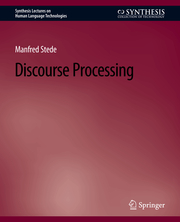-
Zusatztext
-
Discourse Processing here is framed as marking up a text with structural descriptions on several levels, which can serve to support many language-processing or text-mining tasks. We first explore some ways of assigning structure on the document level: the logical document structure as determined by the layout of the text, its genre-specific content structure, and its breakdown into topical segments. Then the focus moves to phenomena of local coherence. We introduce the problem of coreference and look at methods for building chains of coreferring entities in the text. Next, the notion of coherence relation is introduced as the second important factor of local coherence. We study the role of connectives and other means of signaling such relations in text, and then return to the level of larger textual units, where tree or graph structures can be ascribed by recursively assigning coherence relations. Taken together, these descriptions can inform text summarization, information extraction, discourse-aware sentiment analysis, question answering, and the like. Table of Contents: Introduction / Large Discourse Units and Topics / Coreference Resolution / Small Discourse Units and Coherence Relations / Summary: Text Structure on Multiple Interacting Levels
-
-
Autorenportrait
- Manfred Stede is a professor of Applied Computational Linguistics at the University of Potsdam, Germany. He obtained his Ph.D. in Computer Science from the University of Toronto in 1996 with a thesis on language generation; in those years he studied discourse structure primarily for its role in text generation. After working for five years in a machine translation project at TU Berlin, he moved to Potsdam in 2001, where his interests shifted to text analysis. He conducted research projects on applications like information extraction and text summarization, and on more theoretical matters like the semantics and pragmatics of connectives. In conjunction with research on discourse parsing, he began to work on argumentation in the 2000s, focusing first on newspaper editorials. Following the design of an annotation scheme, he proceeded to work on approaches to deriving argumentation structure trees from short texts, and on various other aspects of argumentation mining.
Detailansicht
Discourse Processing
Synthesis Lectures on Human Language Technologies
ISBN/EAN: 9783031010163
Umbreit-Nr.: 5885128
Sprache:
Englisch
Umfang: ix, 155 S.
Format in cm:
Einband:
kartoniertes Buch
Erschienen am 02.12.2011
Auflage: 1/2011


